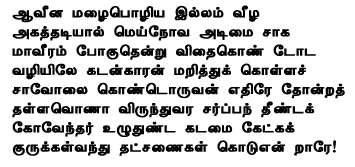
"Ittamudan (Ishtamudan) Enn Thalayil Innapadi Ezhuthivida
Easanum Seththi Vittaano MuttaMutta
Panjamae Aanaalum Baaram Avanukku Annaai
Kalangaadhae Nee Manamae"
-- Avaiyar
meaning, Did Lord Shiva willingly determine to write the fate on my head that I should suffer, and He wrote so? Even if I suffer and fail in all my attempts in life, it is the burden of the God (Lord Shiva) I believe to relieve me out of the troubles. So don't worry my heart.
Ittamudan (Ishtamudan) - Willingly
Enn - My
Thalaiyil - in the head (Thalai: head)
Innapadi - Being so according to the context
Ezhuthivida - Determined to write (Ezhudhu - Write)
Easanum - Lord Shiva
Seththi - Consider, thinking
Vittaano - Wrote
Mutta Mutta - expression used to indicate repetitive attempts
Panajam - Failure, Misery
Aanaalum - Happen to be so
Baaram - Burden
Avanukku - For Him (Lord Shiva in this context)
Annaai - A state of activity
Kalangaadhae - Don't Worry
Nee - You
Manamae - Heart, Mind
So as the song explains, leave all your troubles to God and carry on with your work. Troubles would not hurt you much. There is yet another belief that still solves troubles better. That is, the thought that troubles are an act of God to test us. If you endure those toughness in life, you will shine as gold. Troubles and sorrows are rather things that shape us and brings out of us rare talents within, that makes who we are. There is short story that speakers in some Upanyasam used to tell the gathering. Though the story might sound fictional, it has great meaning in it.
One day a man went to the temple and talked to the God statue. He told that he is facing a lot of troubles and worries in his life. There does not even seem to be any benefit to him in worshipping the God either. So he wanted an answer for it and needs a solution to his problems and live a peaceful life.
The God statue replied, "Long before I was carved into a statue and people started worshipping me, I was a solid rock lying in the mountains. There was no one to help me or heed to my troubles. I was under the hot sun, pouring rains and the cold winters. Later, a sculptor found me and carved me into a statue. Had I not tolerated the baking Sun, the lashing rains, the chilly winters and apart from those, the hammer and the chisel of the sculptor; I would not have been worshipped now by many who come to this temple. So troubles in life are to shape what you are. Facing and tolerating them takes you to a new dimension you never expected."
Now satisfied with answer that the God Statue gave, the man got encouraged and started to live his life bravely.
To even illustrate this concept, there is a song written by the greatest poet of recent times. Rather the king of poets in the 20th century, Kavi Arasu Kannadhasan (Kavi Arasu means King of Poets). The song goes like this

"Pirappil Varuvadhu Yaadhena Kaetaen
Pirandhu Paar Yena Iraivan Panithaan
Irappil Varuvadhu Yaadhena Kaetaen
Irandhu Paar Yena Iraivan Panithaan
Vaazhvil Varuvadhu Yaadhena Kaetaen
Vaazhndhu Paar Yena Iraivan Panithaan
Anubavithae Thaan Vaazhvadhu Vaazhvenil
Aandavanae Nee Yaen Yena Kaetaen
Aandavan Sattrae Aruginil Vandhu
Anubavam Enbathae Naanthaan Endran"
-- Kavi Arasu Kannadhasan
meaning,
I asked God, what do we realise in being born; God instructed me to be born.
I asked God, what do we realise in dying; God instructed me to die.
I asked God, what do we realise in living; God instructed me to live.
I asked God, if experiencing everything is what life is all about, then why are you here.
God came a little bit closer and said, Experience is none other than me!
Pirappil - Birth
Varuvadhu - Derive, realise, come
Yaadhena - What
Kaetaen - Ask
Pirandhu - Be born
Paar - See
Yena - So
Iraivan - God
Panithaan - Instructed
Irappil - Death
Irandhu - Die
Vaazhvil - Life
Vaazhndhu - Live
Anubavithae Thaan - Experiencing
Vaazhvadhu - Living
Vaazhvenil - Life
Aandavan - God
Nee - You
Yaen - Why
Sattrae - A little bit
Aruginil - Close
Vandhu - Came
Anubavam - Experience
Enbathae - is what
Naanthaan - Me
Endran - Act of Person Saying something
A great concept, in simple words! You just consider that all the experiences in life are not only act of God but God himself. The shifting of burden from ourselves to God, gives us the real strength to fight all the tussles and tribulations in life. Although atheists may question the existence of God, they might not feel the benefit they derive out of the invisible means of support. So Tamil literature offers numerous ways to solve troubles and sorrows. It is up for the peoples' mind to choose what they can and what they need. But enduring the troubles makes us what we are and takes us to a new unimaginable dimension.
More to come, until then...


